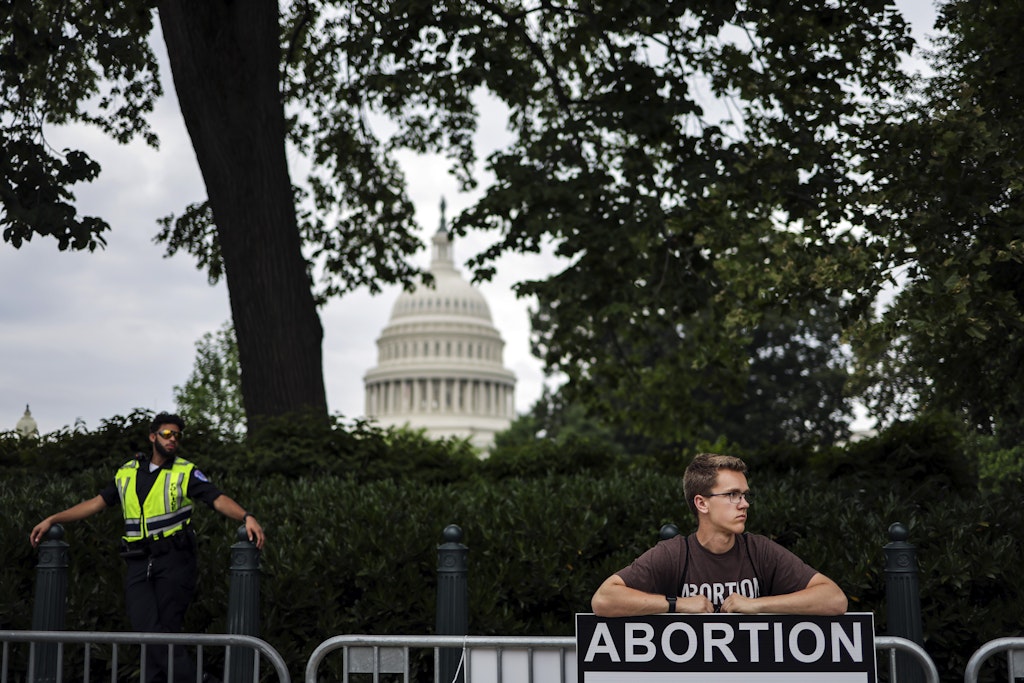OPINION
A post-Roe movement must return to its roots
The overturning of Roe vs. Wade left an unsettled feeling even in many conservative corners of the country. Relief, completion, and yet, uncertainty. Like we might be at the beginning of something, not at the end.
And one of the reasons I think that it feels precarious, even for a pro-life woman like myself, is that a lot of the energy around overturning Roe has turned punitive for vulnerable women and their children.
A movement grounded in love and life has bedfellows with a more malevolent crew: wielding abortion access as yet another tool of polarization and division and hate, turning fellow citizens into bounty hunters for illegal abortions, chasing down the “morning-after” pill, calling out abortion tourism and woke corporations in the primetime lineup.
To be sure, the extremism is in the pro-choice movement too: burning down pregnancy clinics, refusing to limit even late term abortions, demonizing proposals such as Virginia Gov. Glenn Youngkin’s 15-week limit (which is closer to Americans’ preference and the European average than Roe’s 24-week standard.)
But the philosophical and theological underpinnings of the pro-life cause, built on the innate dignity and value of all humans, requires a more compassionate and constructive approach in the days ahead, especially considering the state in which we find ourselves.
We live in a country that’s an international outlier in not supporting new life. Changing this should be the new cause of the pro-life right.
It’s often noted but it’s true: America is the only developed country without paid parental leave. Nearly half of workers don’t have job protection following birth, according to an AEI-Brookings study, and 3 out of 4 workers don’t have access to paid family leave through their employers, according to the Bureau of Labor Statistics.
Many people refer to the first three months postpartum as the fourth trimester; the mother and baby as interdependent as during pregnancy. Yet here, the pro-life community historically has championed few if any protections. According to a study from Abt Associates, 1 in 4 women return to work within two weeks of giving birth. Before there’s sufficient healing, bonding, security.
The most impoverished demographic in our country is kids age 5 and younger. We have a safety net for old age, but we’ve abandoned the young.
High-quality child care options are largely out of reach for many families, resulting in hard choices between work and financial independence or placing a young child in substandard care.
The norm where one parent can stay at home to raise the children is not reality for most. Nearly half of working parents report financial insecurity, according to the Bipartisan Policy Center.
Lack of a support system increasingly appears correlated to abortion itself. The top reasons women cite for an abortion are economic ones. In the most recent survey of abortion patients conducted by theGuttmacher Institute, nearly half of abortions were performed for women living below the poverty line as of 2014 (up from 30% in 1987), and 75% were for women considered poor or low-income.
It’s for these reasons that I urge the pro-life movement to expand its vision to supporting women and children after birth in a whole-life ethic. Much of the pro-life community is aligned securely within the Republican Party which, until lately, has not engaged much on early childhood or women’s health issues.
Indeed, red states on the front lines of rolling back abortion access tend to be those with the fewest protections for new mothers and their children — things like paid parental leave. Changing this backward state of affairs should be where the pro-life cause turns its energy. We are seeing important movement on this front from some on the right, such as Sens. Mitt Romney, Mike Lee, Marco Rubio, Joni Ernst and Bill Cassidy. But we urgently need more.
At the center of Roe is women, not the people on Twitter, championing their respective side, or our mostly male political leadership. The women facing an unplanned pregnancy. Women who don’t feel that they have a choice. Women lacking a community of people around them to love them and support them no matter what. Women facing painful options.
I’ve had two dilation-and-curettage procedures for miscarriages, coded as abortion on the medical documents. You’re in a gown, trailing an IV pole, and walking into a cold, bright operating room, wearing sticky socks so you don’t fall down on the floor. Even in pristine medical settings, it’s invasive. It’s awful. We talk about abortion in the abstract too much, not about what actually happens.
The same with birth, by the way. The stork-carrying-the-baby detracts from the pain, danger, beauty, uncertainty and change in the months to follow. I have three kids. With each birth, I was scared, and that’s with a husband, job, house, health insurance, church and family. Many moms don’t have these things.
There’s a lot of change needed to be a country that values life and motherhood. It’s not just a change in public policy. Pregnancy clinics and churches who no longer need to steer patients away from abortion may well adjust their programming and charity to more robust postpartum and child-based support. We need changes in the narratives we tell ourselves about the value of raising children and our obligations to each other.
The Supreme Court’s ruling should serve as a clarion call for all of us to make America a better place to raise children and be a mother than it’s been for the last half a century.
Especially, for the pro-life movement.
Abby M. McCloskey is an economist and founder of McCloskey Policy LLC. She has advised multiple presidential campaigns. She wrote this column for The Dallas Morning News.